Duchess Harris's Blog
September 4, 2011
THERE'S NO WAY TO FEEL GOOD ABOUT "THE HELP"
I
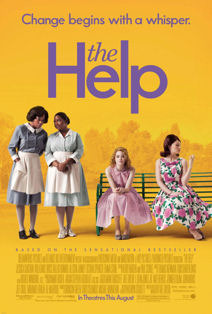 have previously stated that I would not see the movie The Help, and I made this claim on two grounds:
have previously stated that I would not see the movie The Help, and I made this claim on two grounds:1) Ablene Cooper who sued Kathryn Stockett for a mere $75,000 because Stockett stole her story had her lawsuit dismissed due to an elapsed statute of limitations.
2) Not only did the movie earn $50 million in the first two weeks, there is slew of The Help merchandise including a Home Shopping Network line of pots and pans from Emiril Lagasse (how does that make sense?) and the Republic of Tea's The Help Tea – Caramel Cake Black Tea (don't get me started). All additional profit centers for Ms. Cooper and people who never had to experience the demeaning injustices profiled in the novel.
I didn't want to participate in adding to Ms. Stockett's wealth or publicity, but I've been offered so many speaking engagements to discuss the movie since reviewing the novel, that I felt compelled to actually see it.
And I can immediately see why some people might have enjoyed the film. It's a feel-good movie with an all-star cast including Sissy Spacek. A charming Emma Stone plays the well-intentioned protagonist, "Skeeter," a young Southern white woman who wants to write about the "Colored" housekeepers of Mississippi. She claims that Margaret Mitchell glorified the Mammy Figure, but no one asked Mammy how she felt.
We are led to believe that because Skeeter asks Abilene, the Black maid, how she feels that she is not implicated in Abilene's segregated reality. We learn however that Skeeter's mother is a member of the Daughters of the American Revolution, and that her boyfriend is a segregationist. These facts are not explained, and decent music coupled with "Mad Men" fashion seduces us into enjoying the plot.
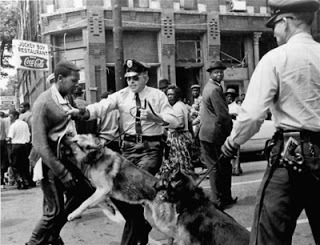 We are not expected to question that the story is set in a Klan-less 1963 Mississippi. There is no context for Governor Ross Barnett, no illustration of the real life violence of the White Citizens Council, and no explanation of the heroic life of Medgar Evers. In fact, the only Black male characters in the movie are the Preacher and Minnie's faceless husband "Leroy" who beats her.
We are not expected to question that the story is set in a Klan-less 1963 Mississippi. There is no context for Governor Ross Barnett, no illustration of the real life violence of the White Citizens Council, and no explanation of the heroic life of Medgar Evers. In fact, the only Black male characters in the movie are the Preacher and Minnie's faceless husband "Leroy" who beats her.What the audience needs to consider is that "Sassy Minnie" isn't a talking cookie jar, and Minnie and her female relatives were in more danger from the white men in town than any Black man in their family. This story is a southern segregation fantasy that erases the unwanted advances of the powerful white men of Jackson. There is no allusion to this, and if you are born in 1993, like an incoming first year college student, you might not question why there aren't any lighter skinned Blacks in the movie who look oddly enough like the mayor. Minnie is our nation's Nafissatou Diallo and neither one of them got any help.
The idea that poor white trash Celia would have befriended her Black maid is absurd. History tells us that impoverished whites would have behaved worse than the wealthy Hilly, who is brilliantly played by Bryce Dallas Howard. The problem with this character is that Hilly is depicted as an aberration as opposed to the norm. This also glosses over the real-life terror experienced by Black women at the hands of white women during this time period.
The only recourse that Black women have in this movie is to cook with their own feces and "sass" the women who can hire, fire, and incarcerate them.
Even though Abilene's closing line states her satisfaction that she had the opportunity to share how it felt to be her, I left wanting to read the book or screenplay that she writes. In that version Cicely Tyson would have been more than a backdrop, Viola Davis would have been the lead actress and Octavia Spencer could liberate Aunt Jemima without baking chocolate shit pie.
August 12, 2011
Kathryn Stockett Is Not My Sister and I Am Not Her Help
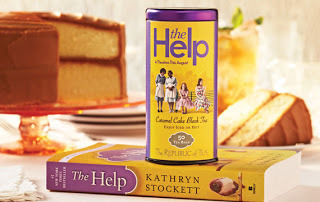
As many of you know, Sister Scholar cross-posts with the Huffington Post. I received so many comments requesting "context" for my previous blog entry, KATHRYN STOCKETT NEEDS HELP
http://www.huffingtonpost.com/duchess...?
I decided to write a 1,800 word article providing more background.
Here it is
http://www.thefeministwire.com/2011/0....
July 25, 2011
KATHRYN STOCKETT NEEDS HELP
It started with the extremely unpleasant showdown between Gloria Steinem and Melissa Harris Lacewell, (now Perry) surrounding Steinem's NY Times op Ed about then-Senator Barack Obama.
This was followed by the late Geraldine Ferraro's dismissive comments that Senator Obama was winning the race because he was not White.
"If Obama was a white man, he would not be in this position. And if he was a woman of any color, he would not be in this position. He happens to be very lucky to be who he is. And the country is caught up in the concept."
And even now that we have an elegant Black First Lady, our popular culture obsession is with the "largely fictional" book, The Help. Sounds like an opportune moment for second wave feminists to engage in some serious deconstructionist critical analysis.
Or maybe not.
I recently purchased a copy of the New York Times best-selling novel with an open mind despite its criticism. I assumed the book would be racially problematic, because for me, most things are.
The first chapter is about a black maid Aibileen, and I hoped that maybe the book would actually be about her. But then this is America, and any Southern narrative that actually touches on race has to focus on the noble white protagonist (in this case, Miss Skeeter, in To Kill a Mockingbird, Atticus Finch) to get us through such dangerous territory.
Which means that the only character left for me to identify with is the maid who has to tend to Miss Skeeter's emotional sadness concerning the death of her nanny (who loved her more than her own White momma).
Perhaps the only thing sadder than Kathryn Sockett's unexamined life is Salon.com's writer Laura Miller's analysis of the legal controversy surrounding it. In her article, The Dirty Secrets of The Help, she writes:

"At issue is Aibileen Clark, a character in The Help…Those of use who have read The Help may also wonder why anyone would be "severely" distressed or outraged to be likened to the noble Aibileen. Although poor and uneducated through no fault of her own, Aibileen is intelligent, brave and kind, apparently without significant flaws. Cooper's lawsuit does manage to unearth two remarks from the novel in which Aibileen seems (arguably) to disparage her own color, but they are tiny scratches on an otherwise glowing portrait. The suit further claims that Cooper finds it "highly offensive" to be "portrayed in The Help as an African-American maid in Jackson, Mississippi who is forced to use a segregated toilet in the garage of her white employer."
 Here's one of those "tiny scratches" posted on ABCnews.com.
Here's one of those "tiny scratches" posted on ABCnews.com."That night after supper, me and that cockroach stare each other down across the kitchen floor," Aibileen says in the book. "He big, inch, inch an a half. He black. Blacker than me."I refuse to waste my own blog space deconstructing everything that is wrong with this, because I have saved the "best" for last:
"Although it's difficult to believe that anyone would feel "outrage, revulsion and severe emotional distress" at being identified with the heroic Aibileen, her employer, Miss Leefolt, is another matter. A vain, status-seeking woman married to a struggling, surly accountant and desperately trying to keep up appearances in front of fellow members of the Jackson Junior League, Miss Leefolt is the one who insists on adding a separate "colored" bathroom to her garage. She does this partly to impress Miss Hilly, the League's alpha Mean Girl (and the novel's villain), but she also talks obsessively about the "different kinds of diseases" that "they" carry. Furthermore, Miss Leefolt is a blithely atrocious mother who ignores and mistreats her infant daughter, speaking wistfully of a vacation when "I hardly had to see [her] at all. Like all of the white women in the novel (except the journalist writing the maids' stories), Miss Leefolt is cartoonishly awful -- and her maid has almost the same name as Stockett's sister-in-law's maid. Fancy that!"
Miller of course is insinuating that the real life Aibleen lacks the agency to have initiated the lawsuit, and that Stockett's sister in law coerced her. The plot thickens (sorry, I couldn't resist) on the revelation that Robert Stockett III (the author's brother) has cosigned his longtime nanny's claims. Not that Miller gives him much credence.
So, in the end, The Help is about a white woman and the lawsuit is about a white woman, maybe because it's always about them. Which is why they need help.
July 5, 2011
SISTER LAW PROFESSOR
On graduation day, I seriously wondered if I would have been better off with the tummy tuck.
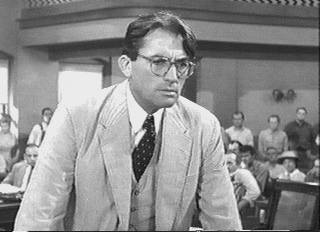 Successfully navigating law school was nothing compared to trying to sit quietly during the commencement speech, which was anti-climatic to say the least. Our speaker waxed on at length about To Kill a Mockingbird and Atticus Finch as the epitome of the kind of lawyer we should all aspire to be.
Successfully navigating law school was nothing compared to trying to sit quietly during the commencement speech, which was anti-climatic to say the least. Our speaker waxed on at length about To Kill a Mockingbird and Atticus Finch as the epitome of the kind of lawyer we should all aspire to be.This is exactly the kind of tired, mid-twentieth century white liberalism that still permeates the study and practice of law, a view that has not done much to address the great inequality faced by people of color today in our judicial system.
Sure, Gregory Peck gave a great performance, but with all due respect to the fans, the book was published exactly fifty years before our class enrolled in law school. Fifty years. Why are law professors still looking to a book written fifty years ago for a model of racial equality that will work today? Does Microsoft do that? Is Bill Gates planning a new release of Windows that only works with floppy disks and dial up internet?
A little insight into the contemporary discussion regarding this book is not all that difficult (you don't even need to ask a librarian or use a micro-fiche to find it). There's Malcolm Gladwell's, thoughtful piece in The New Yorker that argues that the "[b]ook that we thought instructed us about the world tells us, instead, about the limitations of Jim Crow liberalism in Maycomb, Alabama."
If The New Yorker is a little too mainstream for you, in 1992, Monroe Freedman, a legal ethics expert published two articles in the national legal newspaper Legal Times calling for the legal profession to set aside Atticus Finch as a role model.
Freedman argued that Atticus still worked within a system of institutionalized racism and sexism and should not be revered. Critics of Atticus such as Freedman maintain that Atticus Finch is morally ambiguous and does not use his legal skills to challenge the racist status quo in Maycomb.
Take Calpurnia, Atticus' Black maid who is portrayed as loving nothing more than raising his children and keeping his house clean. How many of you think it'd be fine with Atticus if Scout married one of Calpurnia's own children? My point exactly.
None of this was mentioned in our commencement speech. Instead, the speaker gave a high school plot analysis that frequently used the word "Negro," and explained that one of her friends entered the profession because of Atticus Finch. This is not the first time I've heard this. But as of 2010, African Americans made up 12.6% of the U.S. population, and in 2009 made up 39.4% of the prison population. Apparently the adoration of Atticus Finch hasn't put a dent in the way racial inequality still plays out in our legal system.
I walked across the stage to get my diploma hoping that my kids wouldn't ask me at dinner what a "Negro" was, and I reflected that I had earned a degree that assumes that law is racially neutral.
Six weeks later, after returning to a life that didn't require studying for multiple-choice exams, I received the following e-mail: "I am pleased to invite you to teach the 'Race and Law Seminar' during the 2011 summer session. (Blah, blah, blah…Blah, blah, blah.) We welcome you to our adjunct faculty."
That has to be a record—six weeks. So in May, I returned to law school to sit on the other side of the desk with the hopes of challenging my former classmates' world-view.
During our first class we explored how we had been taught law. We learned about Langdell's "case-dialogue" method and the school of thought that coincides with it: Formalism. We then examined the Legal Realists who posed the first critique of Formalism, followed by the Critical Legal Studies Scholars. We covered this background so that they could understand how, when, and why Critical Race Theory entered the Academy.
On the second day of class we viewed the documentary, Race - The Power of An Illusion: Episode Three: The House We Live In. After that we discussed the concept of "Whiteness."
And here's where the law profession idealization a la Atticus Finch always hit the proverbial brick wall—I'm continually astounded that this notion is so contentious. Why don't people understand that this is a legal category from the Articles of Confederation that defined citizenship? Don't look at me, it wasn't my idea.
We then spent the following six weeks reading critical race theory, and as their final written assignment I had them write a ten page critical analysis of Beyond All Reason: The Radical Assault on Truth in American Law. It was with this text that we came full circle; the authors Farber and Sherry, both long-standing liberals, argue that "radical multiculturalism" gives liberalism a bad name. They claim that race theorists embrace a system of thought that admits no objective reality, no truth, and no hope of a just or equal society.
On the final day of class I left the students with this question—is critiquing a post-racial or color-blind America in 2011 really "beyond all reason?"
The students were too indoctrinated to "look behind the mirror" to see their whiteness, but they thanked me for being "fair." Despite their resistance to critical thinking, I still left the course with a sense of satisfaction. It wasn't quite a trip to Cabo, but I had somehow healed my racial trauma from law school.
And I finally felt that after four years, I had transitioned from sister law student to sister law professor. Mid-life really couldn't feel better.
March 23, 2011
ONCE IN A PERIGEE MOON
The last time my mom, brother, and sister and I were together for a happy occasion was June 1980 for my sister's wedding. December of that year, my brother enlisted in the Army and spent the next ten years in Germany.
 For the most part, my siblings missed my formative years because I was what you might call a "bonus baby." When I came along my sister was already 14 ½ and my brother was 12. We were all together in 1985 when my Dad had a heart attack, but those were tense times. We reconvened again in December 2006 when he was dying, and as one might expect, things were said that shouldn't have been. When he finally passed away in April 2007, we attended the funeral with the families we had made for ourselves, and each of us turned to them for comfort.
For the most part, my siblings missed my formative years because I was what you might call a "bonus baby." When I came along my sister was already 14 ½ and my brother was 12. We were all together in 1985 when my Dad had a heart attack, but those were tense times. We reconvened again in December 2006 when he was dying, and as one might expect, things were said that shouldn't have been. When he finally passed away in April 2007, we attended the funeral with the families we had made for ourselves, and each of us turned to them for comfort.It wasn't until the fall of 2010 when I had a pulmonary embolism that I realized I just wanted one adult memory with my siblings when we weren't distressed. I saw that there would be a "Black politics" conference an hour from where they lived, and grabbed the opportunity. I invited my brother, my sister, and our mom to join me for lunch.
Family dynamics have a way of being ingrained, and I had forgotten an old one that was pretty sweet. When we all lived at home I was "the baby." This meant that I was immune to the rivalry that existed between my siblings and they were both pretty kind to me.
Over the years our relationships changed and the "baby status" had been replaced with, "Who does she think she is?" But I was able to put that aside, maybe because I was in a good place emotionally. I don't know if it was the embolism, the slow and painful death of a dear friend to cancer, or just the fact that by now we all had bifocals; but we were good to each other on Saturday. We listened to each others' stories and learned about the life experiences that we hadn't shared.
My brother brought his daughter, who is now the age I was in 1980. Looking at her reminded me of how we used to be. The visit was only two hours, and when my Mom climbed into the car, she said to me "Bye, Baby." My sister-in-law giggled, "Baby?!??!." I laughed and said, it's like that Helen Reddy song, "She's 41 and her Momma still calls her baby." I stood there waiving as they pulled away.
I now have one good adult memory with my family of origin. With my people, you only get that once in a perigee moon.
March 7, 2011
SEX ED AND THE MAGICAL UTERUS
They gave us two weeks to read the book with our child, and then the girls would discuss it at school with the female first grade teacher, and the boys would discuss it with the male first grade teacher. This all seemed reasonable.
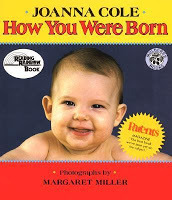 When I picked up the book, which Parent's Magazine dubs, "The best book we've seen yet on the subject," I was slightly confused. I wouldn't consider myself an expert, but I started figuring out where babies came from when I was still wearing Garanimals.
When I picked up the book, which Parent's Magazine dubs, "The best book we've seen yet on the subject," I was slightly confused. I wouldn't consider myself an expert, but I started figuring out where babies came from when I was still wearing Garanimals.Now if you factor out assisted reproductive technology, and I apologize to my infertile and/ or lesbian friends—there is a penis somewhere in the conception story.
So I decided that I must have missed the penis in the 48-page book. As if one could. But on a second and then third reading, I never spotted the organ that I was glad to meet somewhere between the Garanimals stage of life, and the push-up bra phase.
I did some research. According to School Library Journal, the original version of the book came out in 1984. By 1993, "the diagrams of the male and female reproductive systems are left out."
Yes, those minor, unimportant details.
I have moved from confusion to concern. In 2011 we are sophisticated enough to read with this our child,
"You went from the uterus into the vagina, a special tunnel that connects the uterus to the outside. The vagina can stretch wide to let a baby pass through. First your head appeared. Then your whole body came out;" (p 34)
But the only explanation for how the baby got there is,
"In a man's body are sperm cells. The sperm cells have long tails and can swim. When a sperm and an egg join together, they form a special cell that can grow into a baby." (19)
Now when my kids ask where the heck the sperm cells are, where is the illustration for that? Why are we comfortable labeling the uterus and vagina, but not the penis? In 2011 women's bodies are for display, and men's bodies aren't?
Joanna Cole leaves the child confused thinking that women are solely responsible for childbirth, and this message isn't helpful in a political climate that wants to control women's bodies.
Their effort to control women's bodies makes sense to me now. We have The Magical Uterus.
December 30, 2010
A TOAST TO JUDY ROBINSON
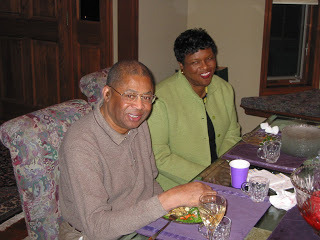
The saddest event of 2010 is that I will not be able to attend my dear friend's funeral today because the doctor has not given me clearance to fly. If I were in Williamsburg, Virginia, this is what I would say:
On April 26, 1998, I opened my front door and there was Judy Robinson holding a plant and welcoming me to the neighborhood. I was shocked to find out that another Black woman lived across the street.
I welcomed her in and was even more surprised that she was an alumna of Hampton Institute (where my grandfather had taught), had lived in Connecticut (where I had grown up), and lived in Philadelphia (where I had gone to College). If that wasn't enough, she mentioned her sorority, and I realized that we were both "Delta Girls."
Despite all of this overlap, I never thought that she would be my best friend for 12 years. Judy was 25 years my senior and more comfortable in her own skin than I ever thought I would be.
Judy knew how to live and we all used to say it long before we could imagine the alternative. I would admire her zest for life, and she would say, "This is not a dress rehearsal." Every day for her was a grand performance, and I was always there to cheer.
Judy would go to the Farmer's Market and purchase fresh gladiolas and put them in a Waterford vase. I'd ask her if she were expecting company, and then I realized they were for her. She knew how to treat herself.
She drove the most fabulous Lexus that I have ever had the privilege to sit in. She subscribed to Architectural Digest and her home decorating skills made Martha Stewart and B. Smith look "common." She wore clothing brands that I had never even heard of, and bought her own fine jewelry. I was witness to her Chicago shoe shopping, and I was with her when she purchased a mink coat-- with cash.
Judy wasn't shallow, she had style. She was glamorous like a 1940s movie star. She reminded me of the Newport News, Virginia native Pearl Bailey.
Judy was one of the savviest Black women of her generation to excel in Corporate America. She was recognized in Ebony Magazine for her climb to the top. But Judy was a product of segregation and was smart enough to critique a system that sometimes rewarded her, and sometimes didn't.
Judy balanced her executive life with friendships that were so deeply rich, that instead of envying her—I wanted to learn how to be a part of it. I would get excited to hear about her annual pajama party when she and two college friends would "sleep over." They did this for more than 40 years. The last social event that Judy did before she was hospitalized was to go to the Naval Academy with these friends. When the weekend was over, her health took a turn for the worst. Deep inside, I knew Judy had held on for one more "big girl" sleep over.
My favorite memory of Judy was my last visit to Virginia. When she dropped me off at the airport, she shouted after me, "Love You." I turned and shouted back, "Love you more." Judy stood there shaking her head, and a woman watching us smiled. When Judy returned to Virginia, she left the peninsula smiling.
On this Judy Robinson, I will not budge—, I loved you more.
May God Bless and keep you.
November 21, 2010
Giving Thanks
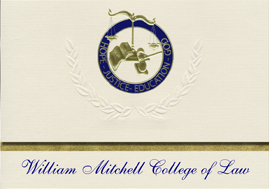 Exactly two months ago I was hospitalized with a pulmonary embolism. And today was my last law class—ever! I am grateful to be alive, and grateful to be graduating.
Exactly two months ago I was hospitalized with a pulmonary embolism. And today was my last law class—ever! I am grateful to be alive, and grateful to be graduating.When I started law school all three of my kids were in diapers, and I worked full time the first two years. Despite numerous obstacles, I have walked this long and winding road and reached my goal. I have very few regrets because I know that I did the best that I could with what I had. Law school wasn't what I expected, but I surprised myself with how many times I got up after being knocked down. I only missed one day of class after my pulmonary embolism, and I returned to law school more determined than ever.
The rigor of Law School enhanced my discipline; and in turn I contributed with an online race and the law journal. In Contracts they call that a bargain for exchange. I am humble enough to realize that I took more than I gave; but I am proud to have launched the first online, interactive scholarly publication dedicated to the complex issues surrounding race and the law. As Ruthie Wilson Gilmore said in her Presidential Address to the American Studies Association, "Infiltrate what exists, innovate what doesn't." Immigration law is not on the bar, and I hope my small innovation with this journal will contribute to a re-examination of where our legal system doesn't provide equal protection under the laws.
I have numerous critiques of the law school curriculum. I think for law school admission, there should be more of a "subject matter" baseline. Engineering Majors struggle with the Constitution more than they should, and Humanities people like me have no business calculating damages in Torts. I think letting certified student attorneys serve clients without direct supervision is dicey. Law Journals might consider blind/peer review.
Finally, I think that the three courses that impacted me the most were Poverty Law, Race and the Law and Feminist Jurisprudence, should join Estates and Trusts, Corporations, and the Uniform Commercial Code as knowledge that is worthy to learn for the bar. After more than three years of training, no one is less surprised than I am that the disciplines which helped corporations be regarded as people is elevated over disciplines that ensure the rights of actual human beings.
Given the choice, would I study law again? Definitely. Why? One of my most difficult law professors told me that I willing entered the master's house, knowing that his tools would not destroy it.
I didn't go to law school to destroy the master's house. I went to law school to learn the master's tools, so that I could build my own house. We'll see how that goes.
Happy Thanksgiving and be thankful; I am!
October 21, 2010
I Was Anita Hill
In October of 1991 I was 22 years old and in my first month of graduate school. It was the first time I'd left the Eastern seaboard where I'd always used public transportation. Without understanding the Midwestern landscape I moved to Minnesota with no car. I had broken up with my East Coast boyfriend and I was the only Black student in my department. I couldn't afford long-distance calls and Al Gore hadn't invented the internet, so I was often glued to the television.
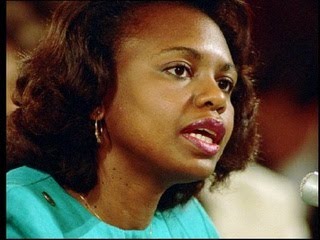 I watched the Anita Hill Clarence Thomas hearings every day. Even though Anita Hill was a Republican social conservative, she was a Black woman who taught law, and that was my dream. I watched wondering, what if something horrible like this happened to me? No one believes her.
I watched the Anita Hill Clarence Thomas hearings every day. Even though Anita Hill was a Republican social conservative, she was a Black woman who taught law, and that was my dream. I watched wondering, what if something horrible like this happened to me? No one believes her.A few years later, I started teaching in a department (that I am no longer affiliated with), and I soon found out. We went on an international research trip. We were in a warm destination during January term, and my department chair asked me to go to a topless beach with him.
Similar to Anita Hill, I did not come forward. A well-meaning white colleague (like Nina Totenberg), told the Dean who insisted that I file a grievance. I was untenured and couldn't imagine defying the Dean.
To make a long story short, an investigation was done, and I was not believed. Similar to Professor Hill, I was publicly vilified. Similar to Professor Hill, my career persevered.
I am sharing this story because a few years later I ran into my perpetrator's wife. Unlike Virginia Thomas, she never called my campus phone and she never asked me to apologize.
If Mrs. Thomas thinks that those of us who have experienced this are sorry that we spoke truth to power, well yes Virginia; there is a Santa Claus.
September 29, 2010
President Obama's Report Card
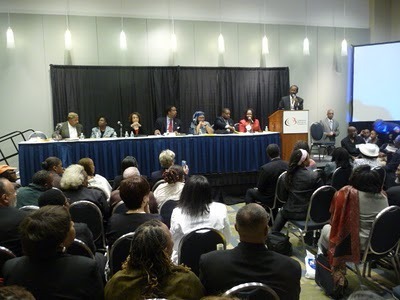 (photo courtesy of Dr. Kimberly C. Ellis)
(photo courtesy of Dr. Kimberly C. Ellis)On Friday September 17, The Washington Post reported that "Black Scholars [were] to debate how to hold Obama 'accountable.' I was fortunate enough to be one of several Shirley Chisholm Presidential Accountability Commissioners to engage in this dialogue at the 40th Legislative Annual Congressional Black Caucus Conference.
To give some background, in 2008 at its State of the Black World Conference in New Orleans, the Institute of the Black World 21st Century (IBW) announced a new initiative: the Shirley Chisholm Presidential Accountability Commission (SCPAC), named in honor of the first black woman elected to Congress and the first black woman to seek the Democratic nomination for president.
Richard Adams, Chairman of the Board of IBW and Convener of the Commission said:
The Shirley Chisholm Accountability Commission was not organized to react to President Barack Obama. As we indicated when the idea of the Commission was announced at the State of the Black World Conference, we need a mechanism that can monitor progress on the Black Agenda, no matter who occupies the White House. We finally have a structure that can fulfill that function in Black America.
Founding Commission Co-Chair, Dr. Julianne Malveaux, tells the story of a conversation between Franklin D. Roosevelt and civil rights leaders, including A. Philip Randolph, who were concerned about jobs for African-Americans. Roosevelt told Randolph to "raise enough hell" so that Roosevelt would have no choice but to address their needs.
Dr. Malveaux related this anecdote to the Commission on Saturday. She said, "He's our brother, and he gets it, but we're not his only constituency. He's not the President of Black America. We have to make him do right. He's not going to do right just 'cause. We've got to make him."
Terry Shropshire transcribed the proceedings:
Malveaux also said: "The economic times that we're in does not warrant an A, except that if it were not for the policies that this administration implemented, we'd be in worse shape than we are in now. If we look at the unemployment rate [it's] 9.7 percent and going up. And the [stated] unemployment rate for our people is fiction. Our real unemployment rate is 28.7 percent. This is an unreported fact. The money that has gone to states? States, not cities. What's the flaw?
The president and his team have done what they're supposed to do, and that is put money in people's hands. What do we know about states? Legislators tend to be rural, melanin-deprived with anti-urban bias making decisions about how money goes to cities. Obama and his team did not understand the level of antipathy [state legislators] have toward progress and urban areas. And where do you find most black people? In the cities. The black poverty rate is above 25 percent. Black income is dropping and others incomes' are rising. Over 50 million people do not have health insurance. They voted down the extension of the unemployment benefits for four months. He's taken a page out the Clinton playbook and says you've got to get something done. That's why I give him a B. In terms of interaction with us, I give him an incomplete because someone from his administration should have been here today."
Makani Nixon, CEO, Praxis Project: "Our infrastructure is under-funded. And It is race that decides who gets what monies, and there hasn't been the kind of civil rights enforcement even though there is an initiative to try to really look at the disparity in funding. That's where we want to see more improvement. If I grade objectively, I have to give him a C."
Dr. Mtangulizi Sanyika, planning and development director consultant, African World Studies, Global Encounters in Houston stated: "First of all, his predecessors get F's across the board. The condition of our people always stay[s] the same and I don't expect to see much difference this time. Not because I don't wish to see such but the cultural constraints of this president do not allow him to eliminate the exploitation that is rooted in the American capitalistic system. Obama's response to New Orleans, post Katrina: unequivocal A. His support for recovery is less ambiguous [than his predecessor]. His understanding [of] the problem is much more brilliant than his predecessor.
Conditions for black people in New Orleans: a grade of incomplete. The … city is whiter and more expensive than it used to be. The number of minority, black, Latino, local and women-owned contractors receiving money to help recovery is dismal. The president can help [make] changes, that is the basis for the incomplete. Our homes are worth less than they were during Katrina.
Urban policy: All of you are living in cities on the brink of disaster. We have [to turn] the effort into coherent policy. … In this area, we give the president a B."
The Commissioners were cautiously optimistic, and The President received a lukewarm C+ on his report card.
The mediocre grade was mainly given due to the fact that the associate director from the White House Office of Urban Affairs, who was scheduled to attend, never showed; however, the President did attend the evening's awards ceremony. Please review my colleague's comments and let us know what grade would you give?



